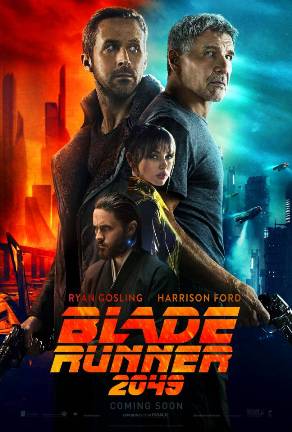
K (Ryan Gosling), a replicant blade runner, lives in a future where new replicants are constructed to obey due to the peculiar, corporate overlord, Niander Wallace (Jared Leto). So the job of the blade runner is now running down old-style replicants who were made before the great blackout. In “retiring” one of these (Dave Bautista), K discovers a secret that his boss (Robin Wright) wants him to follow up on so that it can be destroyed and hidden forever, while Wallace wants that secret for himself. His investigation leads him to missing blade runner Deckard (Harrison Ford). K spends his off-time with a holographic lover, Joi (Ana de Armas), who may or may not be sentient.
Well, they didn’t take the easy way. This isn’t a sequel that just makes the original elements bigger and louder. Nor is it empty, dripping in theme almost as much as Blade Runner was before it. And I had the advantage of attending a double feature with the original so comparisons were easy. Is the new one as successful as the old? No. Is it a masterpiece that will change genre film? No and no. It is interesting and well made, and doesn’t harm its predecessor (there is one attempt to change the meaning of everything that happened in Blade Runner, but that’s just one guy talking and there’s no reason to believe him).
In many ways it is an anti-Blade Runner. The first was Film Noir in a future setting. 2049 is not Film Noir. It has neither the feel, the themes, nor the look, instead being a purer mystery story. Where no one was special in Blade Runner, 2049 is all about a special person. In Blade Runner, individual memories didn’t matter. In 2049, they are everything. Blade Runner was a personal film, about what being alive means to the individual. 2049 is about externals, where what it means to be human is a given, and now we are dwelling on what we should do with our lives, and its answer has to do with large-scale politics. Think Spock in Wrath of Khan. The message here is that individualism pales next to the greater good. There’s a lot of good stuff in there, but at times it feels like the two films are fighting each other.
The future world has changed since the first film. Where before it was a living world, but a sick one, with evil running out of its pores, and yet somehow still beautiful, now it is a dead one, and ugly; a well-shot ugly world, but an ugly one. In 1982 the visuals drew me in. In 2017 they just let me know I don’t want to be there. Blade Runner’s look was directly related to ‘40s Film Noir with a bit of spin from Italian horror. 2049‘s style comes straight out of ‘70s and ‘80s post-apocalyptic cinema. There is less of The Maltese Falcon here, and more Zardoz. I appreciate the difference, even if it is less appealing to watch.
This is a very plot-focused film, and for the most part that plot holds together well. It progresses slowly, but that was a given going in (there is nothing about this film that could be considered fast). There are a few glitches, with characters making some strangely stupid decisions to keep the story going (You are really just going to leave that person laying there? Really? And you’re not going to concern yourself at all with the fact that you are being watched and in one case, aided? Huh.). And we’ve got multiple annoying Michael-Myers-rising-from-the-dead moments, but most of the elaborate story is good and keeps everything trundling along.
If you like call-backs, you’ll be really happy. We’ve got characters who pop up that you’ll remember and musical cues are repeated. Animal figurines are once again a thing. Previous dialog is referenced, and if your favorite part of Blade Runner was enhancing that photo, wow are you in for a treat. If there’s an image, someone will enlarge it. These homages draw extensive attention to themselves, but are still fun and never bothered me.
For such a long and thoughtful film, 2049 lacks intensity and heart. It wants to be important. It cries out that it is. But it isn’t. It is not half as smart as its deeply serious nature needs it to be. Everything was there to make a great film, but it wasn’t used. I didn’t care about the big political and moral notions and nothing in the film makes that large-scale stuff matter. I wanted more of the personal story that pops up occasionally, mostly with Joi. That material is golden, and the sex scene is by far the best moment of the film. I’d have been happy to jettison the entire plot and just focus on K and Joi and what their relationship means. Instead I got a lot of solid world-building, excellent acting, and plenty of subjects to fill several lunch conversations, but no magic. Close to 40 years ago I left the theater enthralled and wishing to see Blade Runner again. I left Blade Runner 2049 tired and unengaged, feeling I’d done my duty in seeing it, but with no desire to do so again any time soon. It’s a fine film, but we won’t be talking about Blade Runner 2049 in 2049.